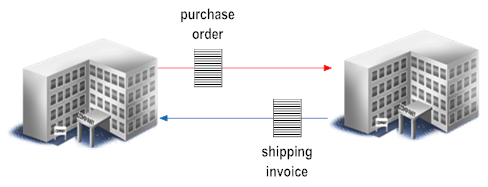B2B Integration
Business to business (B2B) describes electronic transactions between businesses (as opposed to between businesses and consumers). Businesses that engage in electronic transactions are called trading partners, and can include retailers, manufacturers, suppliers, and marketplaces.
Transactions between trading partners usually involve the exchange of business documents using automated processes. A B2B integration network, or trading network, consists of a set of trading partners that conduct business by exchanging mutually agreed-upon business document types electronically. For example, a trading network might include computer retailers, a computer manufacturer, and computer parts suppliers. The retailers might send purchase order documents to the manufacturer, which returns purchase order acknowledgment, shipping notice, and invoice documents. Similarly, the manufacturer might send purchase order documents to the parts suppliers, and so on.
Some industries have developed B2B standards for exchanging business documents. For example, many manufacturing companies use the EDI messaging standard to conduct business electronically. A B2B standard typically defines the business document types and transport protocols that trading partners need to use in exchanges, and specifies document exchange rules.
B2B can include managed file transfer (MFT), a process that ensures protected internal and external data transfers in a centralized system. MFT provides reliable, secure data transfer you can automate based on policies, partners, and permissions. MFT also provides insight and control at every stage of the transfer process, including real-time monitoring, error and receipt logging, auditing, and data tracking. Most MFT solutions include these key components:

MFT servers that perform MFT exchange behind a firewall and support all communications and security protocols.

Proxies/reverse proxies that operate in the demilitarized zone and protect the IP addresses and ports of file senders and receivers.

Clients that enable both human users and applications to administer, report, schedule, and script file transfers.

APIs that third-party applications use to interact and communicate with MFT servers.

